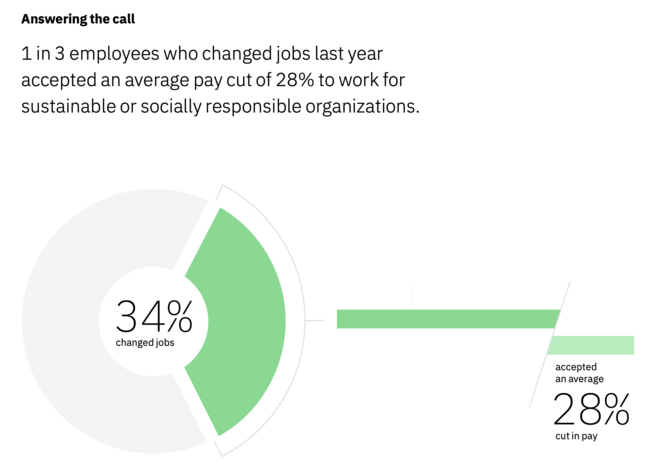Being a sustainable business is a talent advantage, IBM say

There are many reasons for organisations to up their sustainability efforts, not least because of the race to net zero, not to mention pressure from stakeholders, employees, and consumers to take a lead in helping to green the economy.
And since the onset of the pandemic, consumers and employees increasingly expect businesses to be stewards for change, with more than half of consumers saying environmental sustainability is more important to them today than it was 12 months ago, according to the latest research from the IBM Institute for Business Value (IBV).
And if businesses do not respond accordingly, whether in creating more sustainable products, lowering their own company emissions, or behaving in socially responsible ways, then more and more people will vote with their feet.
That includes walking away from a job or turning down a role in a company that an employee doesn’t feel is doing enough when it comes to sustainability and social responsibility.
Employees drawn to sustainable employers, and will even take pay cut
According to IBM’s latest report, two out of three say they are more willing to apply for (67%) and accept (68%) jobs from organisations they consider to be environmentally sustainable. And that figure rises to 80% for those people particularly passionate about the planet.
However, only 21% consider their current employers to be sustainable, and this could translate to a major flight risk. Not something most organisations will want to contend with considering the phenomenon that is ‘The Great Resignation’. With 38 million people having quit their jobs globally in 2021, acquiring and retaining talent has never been more important.
And while upping compensation packages, increasing flexible working, and upskilling opportunities are among the rewards companies are using to acquire and retain top talent, being a company with sustainable credentials is becoming more and more of a draw.
IBM research found that 1 in 3 of those who changed jobs last year accepted a job with an employer they consider to be environmentally sustainable (35%) or socially responsible (40%), and 34% accepted a job offer for a role where they can directly influence environmentally sustainable outcomes.
What’s more, roughly 1 in 3 (34%) of those who changed jobs in the last year say they accepted a lower salary to work for sustainable or socially responsible organisations, on average taking a pay cut of 28%.
These findings highlight a huge employee engagement opportunity for companies that are focused on protecting people and the planet. For example, three-quarters (74%) of people who say their employers are environmentally sustainable feel encouraged to contribute new ideas that support environmental sustainability in the workplace, compared to only 56% who don’t.
However, only 60% of respondents say they’re aware of the progress their organization has made toward their environmental sustainability goals, and just over half (55%) say their employer provides learning opportunities for fostering sustainable practices in the workplace.

How to become a talent magnet
Executives can help bridge this gap by opening lines of communication within their ranks and highlighting the initiatives that help their companies meet their sustainability goals. For example, travel and work location policies have a big impact on a firm’s carbon footprint, so sharing how new approaches are expected to decrease emissions can help people see the bigger picture. Making or supporting ambitious climate commitments and showcasing where the company’s investments back up those claims, can also help boost employee loyalty and morale.
IBM recommends organisations create an open dialogue and feedback loop. Be transparent about your environmental impact and foster a culture where people feel welcome to propose new ways of working – even if it could have a negative impact on the bottom line.
Business leaders should also inspire people to take actions to support environmental sustainability by recognising and rewarding positive actions. Showcase employees who are making an impact to highlight why your company is an employer of choice.
Finally, the report recommends collaborating with partners, suppliers, and industry consortiums. Insist on more robust environmental commitments and actions across your supply chain, and consistently make those commitments known to your employees and shareholders. Consider joining green buying cooperatives and other sustainable initiatives.
IBM Institute’s Balancing sustainability and profitability report






